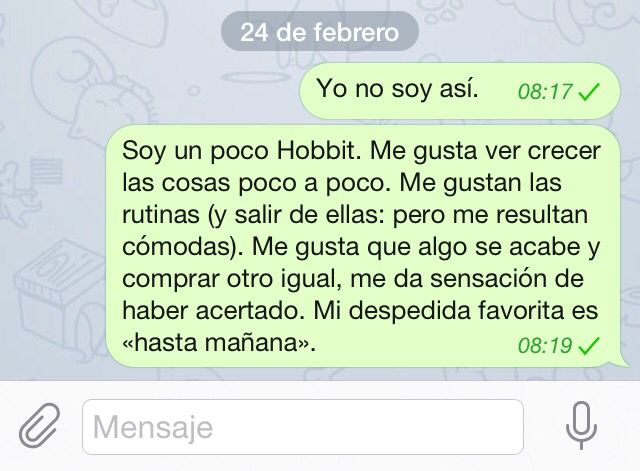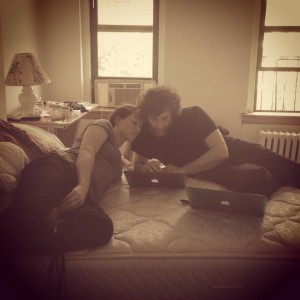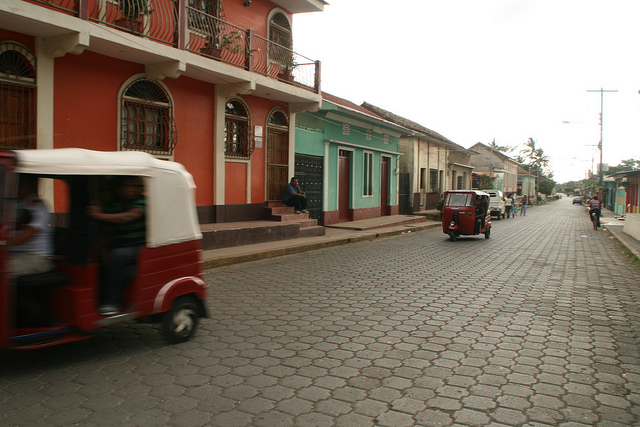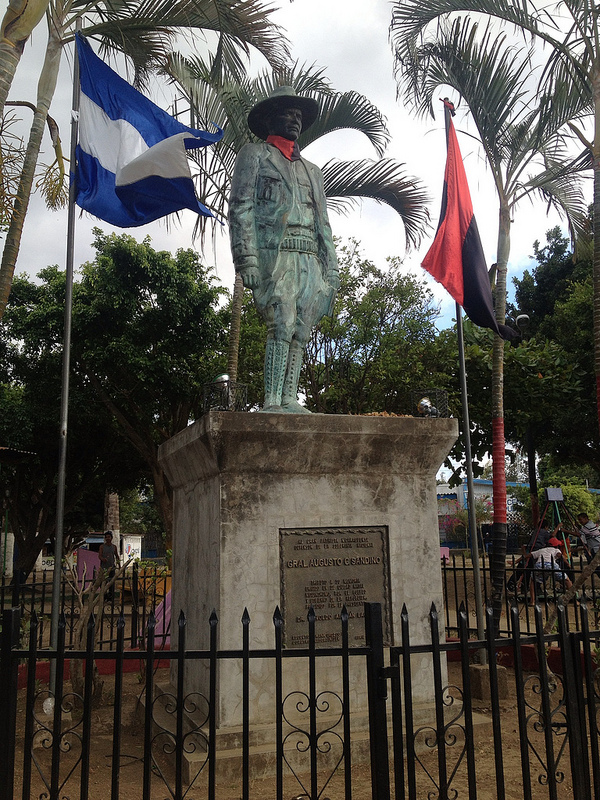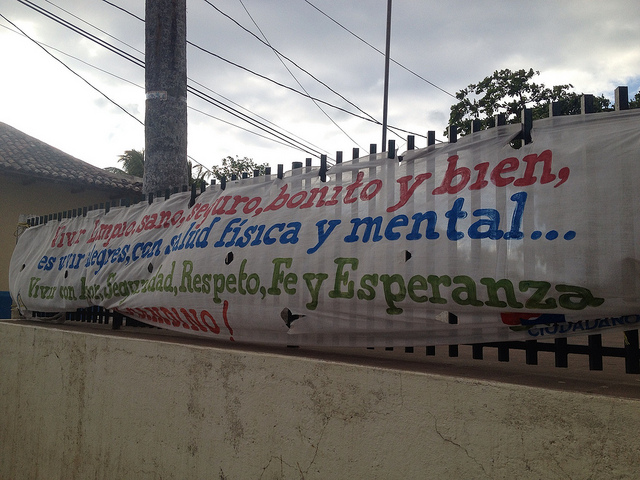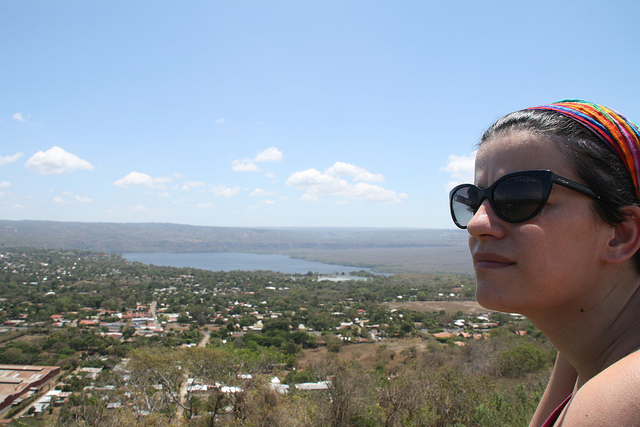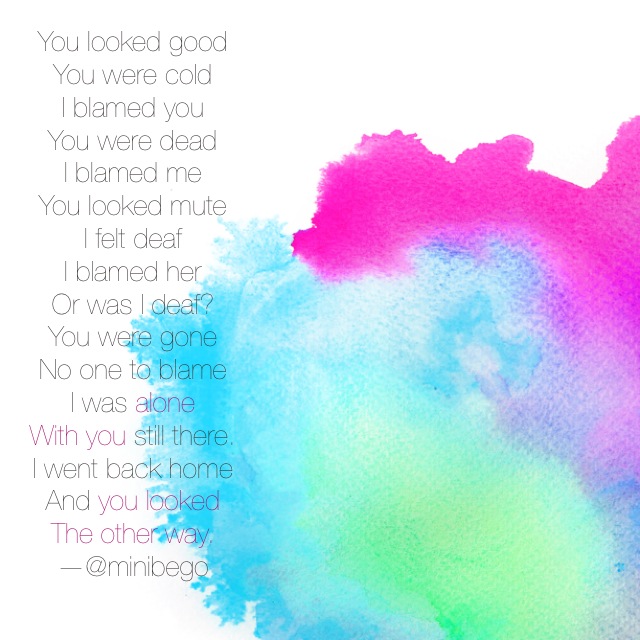I’m a bit of a Hobbit. I like to see things grow, little by little. I like routines (and escaping them: but I find them comfy). I like it when I run out of something and I buy exactly the same one again, I get the impression that I was right the first one. My favourite goodbye is “see you tomorrow.”
Autor: Begoña Martínez
-
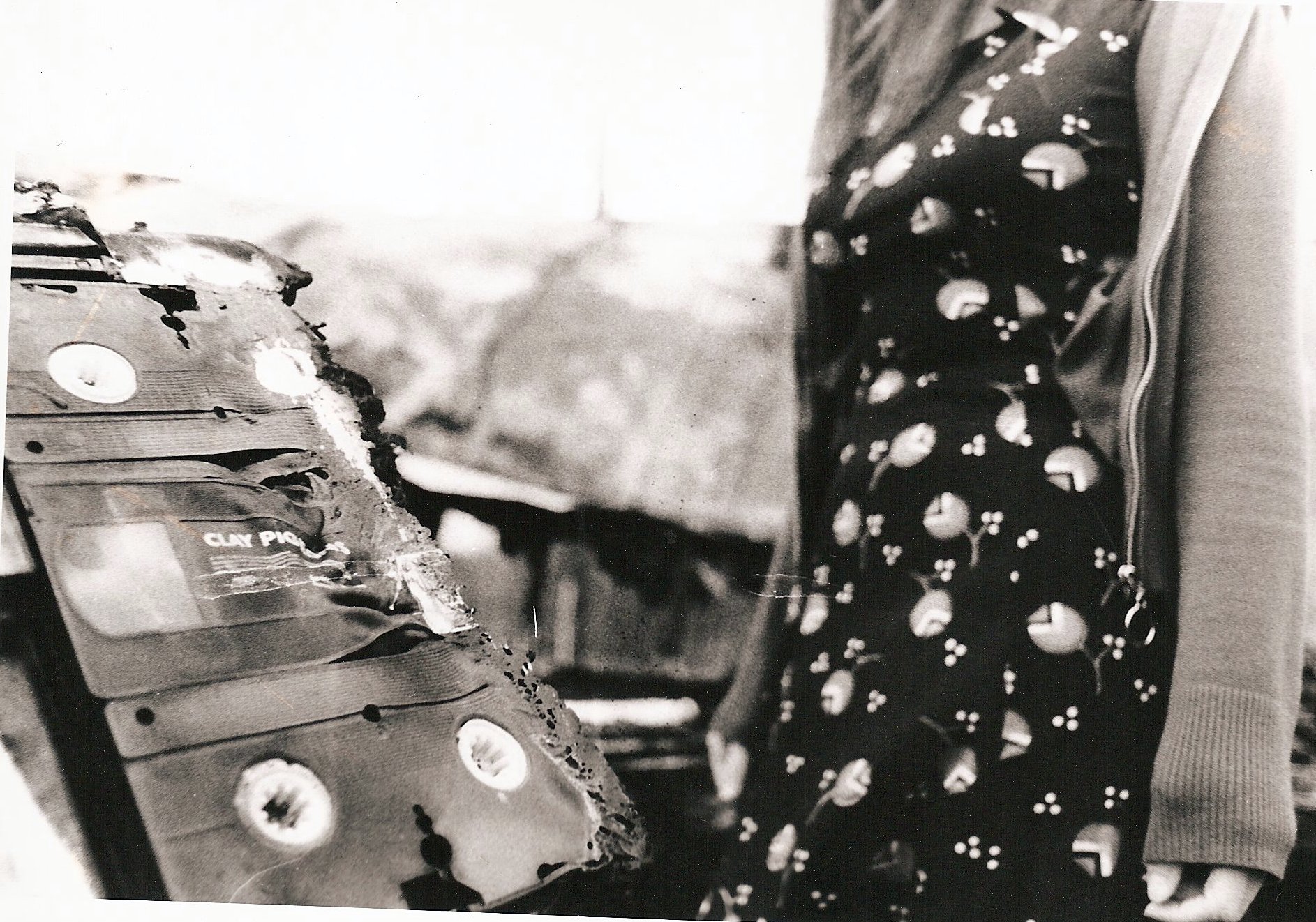
Dame un beso cálido
Un beso como el primer pie en la arena
Un beso como el asiento de atrás, tras la playa
Un beso como la cinta de casette que se ha derretido
Un beso como un semáforo bajo el sol hace treinta años
Un beso como robar una patata frita de la cocina
Un beso como tus orejas cuando tu madre cuenta esa historia
Un beso como Roma ardiendo en la pantalla
Un beso como salir a la pizarra sin estudiar
Un beso como esas fotos tuyas que guardo
Un beso como un termostato roto
Un beso como un ascensor lleno de nuevas en septiembre
Un beso como esa gota que baja
Un beso como el corazón de Islandia
Un beso como la piel tras el sol de la nieve
Un beso como el primer churro de la bolsa
Un beso como un vaquero el 8 de enero
Un beso como un cruce de piernas estratégico
Un beso como un venti volcándose sobre ti en Madrid
Un beso como un café de bar en Murcia
Un beso como mozzarella derritiendo el paladar
Un beso como la mano bajo la mesa
Un beso como ponerte de pie y decir lo que piensas
Un beso como hablar en la radio y decir esto es una vergüenza
Un beso como decir «no me importa la prima de riesgo, me importa que los ricos son más ricos y los pobres son más pobres, y hay más pobres que nunca»
Un beso como el silencio que sigue
Un beso como el silencio de radio
Un beso como esos diez segundos sin decir nada cuando ya te ibas
Un beso como esa mano que se estira de vuelta tras el abrazo
Un beso como esos abrazos que duran bastante más que demasiado
Un beso, como tú quieras.—
Foto: Dylan Hartmann. -

Dame un beso cálido
Un beso como el primer pie en la arena
Un beso como el asiento de atrás, tras la playa
Un beso como la cinta de casette que se ha derretido
Un beso como un semáforo bajo el sol hace treinta años
Un beso como robar una patata frita de la cocina
Un beso como tus orejas cuando tu madre cuenta esa historia
Un beso como Roma ardiendo en la pantalla
Un beso como salir a la pizarra sin estudiar
Un beso como esas fotos tuyas que guardo
Un beso como un termostato roto
Un beso como un ascensor lleno de nuevas en septiembre
Un beso como esa gota que baja
Un beso como el corazón de Islandia
Un beso como la piel tras el sol de la nieve
Un beso como el primer churro de la bolsa
Un beso como un vaquero el 8 de enero
Un beso como un cruce de piernas estratégico
Un beso como un venti volcándose sobre ti en Madrid
Un beso como un café de bar en Murcia
Un beso como mozzarella derritiendo el paladar
Un beso como la mano bajo la mesa
Un beso como ponerte de pie y decir lo que piensas
Un beso como hablar en la radio y decir esto es una vergüenza
Un beso como decir «no me importa la prima de riesgo, me importa que los ricos son más ricos y los pobres son más pobres, y hay más pobres que nunca»
Un beso como el silencio que sigue
Un beso como el silencio de radio
Un beso como esos diez segundos sin decir nada cuando ya te ibas
Un beso como esa mano que se estira de vuelta tras el abrazo
Un beso como esos abrazos que duran bastante más que demasiado
Un beso, como tú quieras.—
Foto: Dylan Hartmann. -

Is that a Barbie in your pocket?
My neighbour once gave bad eye to my husband in the elevator because he was carrying a Barbie in his pocket.
—It’s for my daughter.
—Thank God. Girls should play with girls’ toys, and boys with boys’ toys. Otherwise they end up faggots and what not.
—Uhm, not really. It has actually been linked to genetics, with a frequency similar to that of left-handedness— says @minimalpablo.
—That’s impossible! My wife and one of my sons are left handed!
—…
I don’t know if @minimalpablo was more outraged about the homophobia or the innumeracy. -
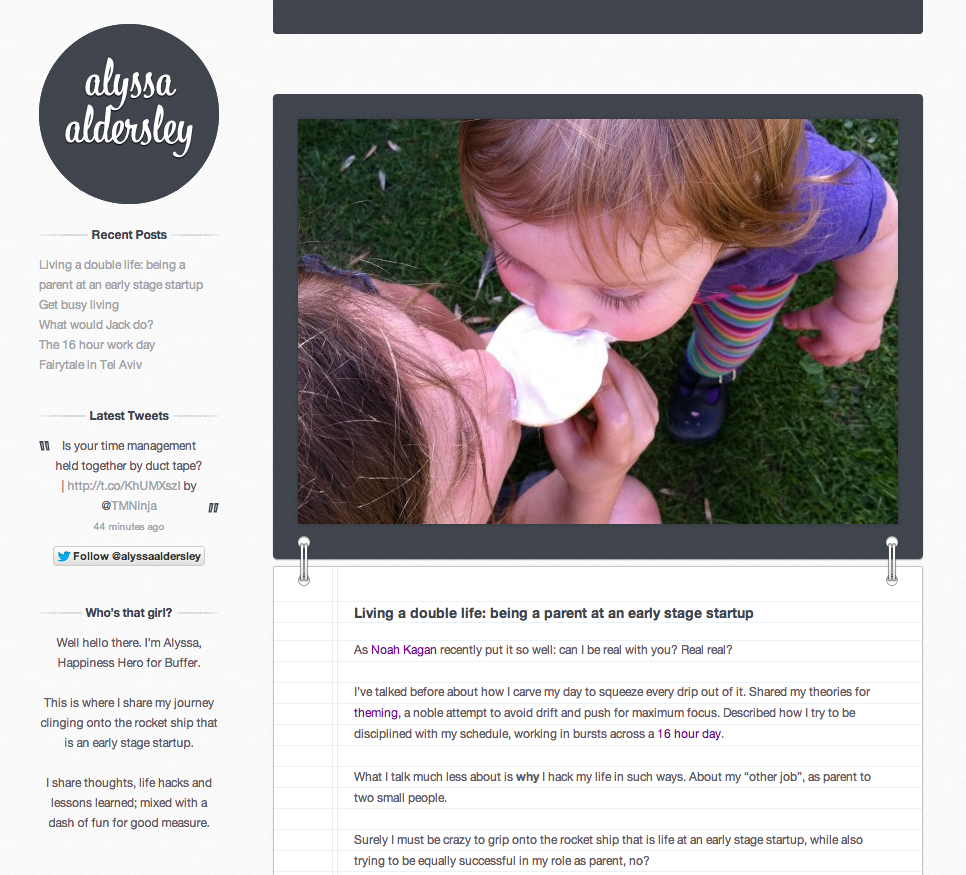
My take on Alyssa Aldersley’s The double life of being a parent at an early stage startup
Josep Martínez just sent me via twitter this very nice nice article and I recommend that you read it too:
Alyssa Aldersley: The double life of being a parent at an early stage startup
After finishing it, I thought that it would be interesting to comment. After commenting, I thought, well, now that I’ve written all this, it could very well post it in my own blog!
070-411So, here it is:
Hi Alyssa,
Thanks for your post, I will definitely try theming (I’m doing it in longer «cycles» so far, lean startup style) but there are other things escaping my radar and that system looks worth trying!Regarding keeping all balls in the air… I have now two kids (6 and 2) and I am now on my second startup (while still involved with the first). A few years ago I founded my first startup while my daughter was one. I thought that that way I would have more time for my daughter and for me (naive, maybe, but it took me where I am). So, I took of these balancing work-family courses. What surprised me the most is that it was about how to take work home. I remember thinking: I have a one year old! What I need is to get work out of my family life. Turns out, I was already doing most of those things, and I wanted to stop doing some of them.Learnings
Leave the house
One of the things that helped me the most was to get an office away from the house. Close, like John Fawcett said in his comment, but separate. In that way things that need doing in the house (as in: get food, reduce chaos) do not get in the way. Sure, they have to be solved, but in their own time. Also, I found that I needed to talk to adults about things unrelated to my work. It will help you fight the cognitive dissonance between cash flow statements in one hand, and wet diapers in the other.Manage priorities and energy, and time will follow
One of the things I learned the hard way is NOT to do some things. Your time and energy are even less limited, so it’s crucial to choose what you will personally do, and what you won’t.- Not everything that someone throws in your plate is your responsibility, or needs doing at all.
- Not everything that you did at the beginning needs to be done by you, always.
- So you do the most important things first (and last!) and leave the rest to others, or in the «someday, but I won’t kill myself over it» pile.
One thing that parenting and entrepreneurship have in common is that you’re steering your babies/startups to independence. You need to be less and less critical everyday (in your children’s case, over 18 years —in your startup, hopefully way before that).Train to be stronger
Another thing that nobody tells you about entrepreneurship or parenthood is that it’s a long marathon, and that you need either to increase your strength and endurance.This is not a metaphor!You need to be stronger than you were before if you’re about to try harder things. You cannot run a marathon by trying harder, or by getting a one-time 3 hour block of spare time. You need to be able to do more in less time at work, and keep your mind work-free during play.Starting a business is draining (and sometimes, brings you unexpected, great bursts of joy).Parenthood is draining (and sometimes, brings you unexpected, truly spectacular and life altering bursts of joy).You need physical and mental strength to face the challenges they bring. In my case, I’ve now set aside half an hour a day for sports training, and it has helped me enormously (in my experience, it’s easier if it’s everyday at the same time). Contrary to intuition, this will give you more energy. In my case, it has improved my mood and and concentration. I was very tired in the afternoons, and now feel more energized for playing and can deal with the kids tantrums for a bit longer.Challenges
I still need to find the help I need to go out more with my spouse. He’s a great dad and I’d say our tasks at home are evened out. It helps that his job as a university professor has some built-in flexibility, and that we got some house-cleaning help. Still, sometimes it’s all too much and all we want to do when the kids fall asleep is to go and sleep too! I wrote about my timetable here (partially in Spanish). The main point of that blog post is that you cannot compare your training with other people’s highlight reels, that you should «never compare your inside with someone else’s outside». I remember Sheryl Sandberg saying something about her daughter shouting «don’t get on that plane, mom» —and I can imagine that this is only what she feels secure by sharing.I think we all struggle, but we chose this because we couldn’t live any other way —not now, in any case. -

Comments on Sticks and Stones, by XKCD
From a Google+ conversation:That is completely and absolutely untrue, unless you admit that anyone other than you has control over your feelings. Words have only as much damaging capacity as you want to give them.Ignacio Torres Masdeu:
The exchange of power is part of many social contracts. But many times we give other people much more power than they deserve or need. This is specially true when family bonds are involved.The thing with words is that they’re code to get to feelings. And your feelings, I wish they were just like write/read/execute permissions in a file system. Only not even that works that well.You want to give people enough to work with —but also to show that you trust them, and because it’s comfier, you give them more than they actually need.
And sometimes, granularity is difficult.
And sometimes, people overstep their boundaries.
And sometimes, boundaries are not set right.
And sometimes, people would try to hack their way into hurting you.
You get stronger security, and you get less user-friendly.
Some would choose verbose mode, some will complain that you talk too much.
Some users will throw errors at you, some will stop responding at all.
Some are poorly documented, and some have crappy customer support.And sometimes… ping! pong! A connection happens.Handshakes. Permissions are requested and granted. Smiles. Information is exchanged. Backup plans work.Happiness gets multiplied. Logs are lovingly kept.And all you exchanged were words.(This goes on on the comments below, just in case Google pulls the plug of yet another service). -

Poverty anywhere is poverty everywhere.
Poverty anywhere
is poverty everywhere.*
Why is that? Why are other people’s problems my problems? Are we all together in this? How can we be together in this if I don’t know who they are, why are we here? If I can’t feel them as I can feel my body. Do my toenails know about my hair? Do my fingers know about my heart?
70-438Somewhere I read: I often wonder if life is easier for other people or if they are better at faking it.
I get to the outskirts of the city and I see all those buildings, and it’s not the big sprawling of tiny houses that bothers me, it’s the big, huge buildings and the tiny flickering lights that make me think of ants, and working bees, and insignificant little lives, with anonymous problems. I just can’t tell if I’m scared because I know that deep down, I’m just one more working bee, in the middle of its working life. Dead and forgotten already, in the grand scheme of things. Maybe I’m scared for all those little bee people I imagine, living in horrible places that I’ll never see, but that I can sort of imagine, because they are in a way, just like mine. With that weird kitchen smell that kitchens other than your own have. With their children and their laundry and their skid marks in the WC. With their fights and flat screens and unpaid bills and salary rises and sudden unemployment. Why do I care about them? Why won’t they ever know that I am here, trying to imagine who they are?
MB2-701* Sounds revolutionary? James Wolfensohn, President of the World Bank, said that in 2002.
Photos: Noktonmagazine.com
